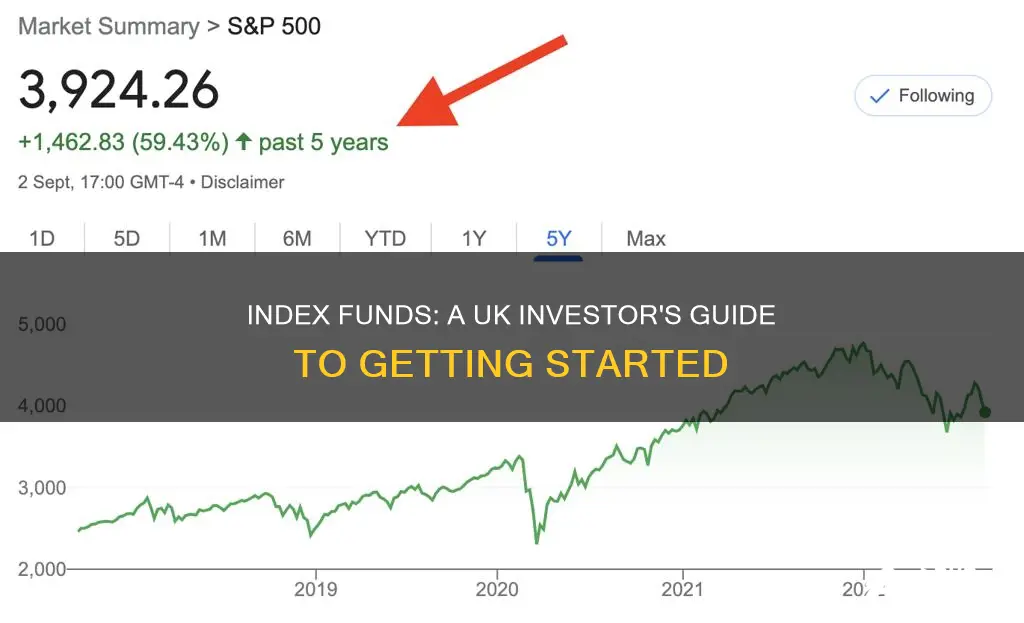
Index funds are a type of fund designed to track the performance of markets and indices, such as the FTSE 100 or S&P 500. They are a passive form of investment, meaning they aim to match the performance of a chosen index rather than outperform it. This makes them a lower-cost option for investors, as they don't require fund managers or analysts. Index funds are also a more diversified investment option, as they hold hundreds or even thousands of shares or bonds, reducing risk. However, they may lack flexibility as they are tied to a specific index and cannot be easily changed. In this article, we will explore the pros and cons of investing in index funds, how they work, and the steps you need to take to start investing in them in the UK.
| Characteristics | Values |
|---|---|
| Definition | A type of mutual fund that tracks the performance of markets and indices internationally or on a country-by-country basis |
| Type | Passive mutual fund or exchange-traded fund (ETF) |
| How it works | Pools money from multiple investors to buy securities with the aim of gaining a mutual advantage |
| Risk | Higher risk than cash or government bonds |
| Investment amount | Minimum four-figure sum to get started |
| Advantages | Instant diversification, broad market exposure, low operating expenses, better returns over a long period, lower fees, transparency, easy to diversify |
| Disadvantages | Lack of flexibility, lack of protection, little control, stressful |
| Examples | Fidelity 500 Index Fund (FXAIX), Vanguard 500 Index Investor Share Class (VFINX), Schwab S&P 500 Index Fund (SWPPX), iShares Core FTSE 100 UCITS ETF |
What You'll Learn

Index funds vs active funds
Index funds are a type of mutual fund that tracks the performance of a market index, like the FTSE 100 or S&P 500. They are a passive form of investment, where the fund 'tracks' the performance of an entire market index. This means that rather than relying on analysts and fund managers to pick individual shares or bonds, index funds invest in a wide range of securities to mirror the performance of a particular index.
Active funds, on the other hand, are a more complex form of investment. They aim to beat the performance of an index and involve a fund manager who plays a significant role in selecting securities, timing trades, and seeking opportunities to outperform the market. Active funds are therefore a more hands-on form of investment, with higher costs and potentially higher returns.
The choice between the two comes down to the level of risk an investor is willing to take, and the amount of control they wish to have over their investments. Index funds are a more passive, long-term investment strategy, whereas active funds are a more active, short-term strategy.
Index funds are often a good starting point for beginners due to their lower costs, diversification, and simpler approach. They are also a solid choice for long-term investors, as they can be a reliable way to build wealth over time. Active funds, on the other hand, may be more suitable for experienced investors who have the time and knowledge to research them carefully and understand the higher risk involved.
It's important to note that investing in any form carries risk, and it's always recommended to seek professional financial advice before making any investment decisions.
Short-Term Investment Strategies: Where to Park Your Money
You may want to see also

How index funds work
Index funds are a type of fund designed to track the performance of markets and indices. They can be incorporated into a Stocks and Shares ISA tax wrapper. They are a type of mutual fund that tracks an index.
Index funds are a passive form of investment. They aim to match and mimic the performance of a financial market index. They are similar to mutual funds in that they allow investors to pool their money to purchase assets in the stock market. However, index funds match the risks and returns of the stock market index they are tracking, which can be beneficial for long-term investments.
An index reflects the performance of a basket of securities of a stock market. In financial markets, indices can include stocks and bonds and reflect the performance of a particular market. Each index has its own composition. For example, the FTSE 100 tracks the 100 largest companies in the UK.
Most index funds tend to fully replicate an index. For example, a fund tracking the FTSE 100 index will buy shares in all 100 companies. The size of each company within the fund will be proportionate to its size within the index. Alternatively, index funds can partially replicate the index. This is where the fund manager holds a sample of shares that are considered representative of the wider index. This usually occurs when the index being tracked is difficult or costly to fully replicate.
Index funds are traded when the markets close, whereas ETFs are traded throughout the day. Index funds often have higher minimum investment amounts than ETFs. They can be bought in £ or $ increments, whereas ETFs are bought by share quantity. ETFs are also more tax-efficient than equity index funds.
Bond Funds: A Beginner's Guide to Investing Wisely
You may want to see also

Pros and cons of index funds
Index funds are a popular investment choice, especially for beginners, due to their low fees, diversification of investments, and stable long-term returns. However, they also have some drawbacks, such as a lack of flexibility and the inability to outperform the market. Here is a more detailed look at the pros and cons of index funds:
Pros of Index Funds:
- Low fees: Index funds are passively managed, meaning the fund managers take a hands-off approach and do not actively research and choose which stocks to invest in. This results in lower management fees compared to actively managed funds.
- Diversification: Index funds invest in a wide range of stocks, bonds, or other securities, providing investors with instant diversification. This helps to reduce risk as your portfolio is less likely to be significantly impacted by the poor performance of a single stock.
- Stable long-term returns: Index funds tend to provide more stable and predictable returns over the long term. They are often considered an excellent core asset for retirement accounts and are recommended by financial advisors for average investors.
- Simplicity and transparency: Index funds are straightforward and simple to invest in, especially for beginners. They are also transparent, as they track a specific index, allowing investors to easily understand the risks involved.
- Broad market exposure: Index funds offer broad market exposure, allowing investors to gain access to different markets across several sectors and industries.
Cons of Index Funds:
- Lack of flexibility: Index funds track a specific market index and cannot pivot away when the market shifts. They lack the flexibility to respond quickly when the prices of the assets they hold fall.
- Inability to outperform the market: Index funds aim to mirror the performance of a specific market index and are designed to move in line with the market. This means they cannot outperform the market and deliver returns higher than the index they are tracking.
- Market risk: While index funds provide diversification, they are still subject to market risk. When the market or sector performs poorly, your index fund will likely follow suit.
- Moderate annual returns: Due to the large number of assets held by a single index fund, the possibility of achieving significant annual returns may be diluted.
- Fewer opportunities for short-term growth: Index funds are typically considered long-term investments and may provide slower gains compared to investing in individual stocks, options, crypto, or other higher-risk investments.
In summary, index funds are a good option for investors seeking low-cost, diversified, and passive investments. However, it is important to remember that they are subject to market swings and may not provide the same flexibility as actively managed funds. It is crucial to consider your investment goals, risk tolerance, and financial situation before deciding to invest in index funds.
Mutual Fund Investment: Where to Begin?
You may want to see also

Risks of investing in index funds
Index funds are a type of mutual fund that tracks the performance of markets and indices. They are considered a safe investment option due to their low cost, passive nature, and low turnover. However, there are some risks associated with investing in index funds that investors should be aware of. Here are some detailed paragraphs outlining the potential risks of investing in index funds:
Risk of Market Downturn
Index funds are designed to track the performance of the underlying index or the stock market. This means that if the market experiences a downturn, your investments in index funds will also lose value. For example, during the 2008 market crash, the S&P 500 lost approximately 38%, and any investments in S&P 500 index funds would have seen similar losses. It is important to remember that index funds will follow the market, whether it is going up or down.
Concentration Risk
Index funds that track market-cap-weighted indices, such as the S&P 500, invest more heavily in the largest companies within the index. This can lead to a concentration of investments in a few dominant companies, often referred to as the "Magnificent Seven". As of October 2023, these seven companies accounted for about 28% of the S&P 500. This concentration can impact the diversification of your portfolio and expose you to higher risk if these companies underperform or experience a downturn.
Limited Control and Active Risk
Index funds are passive investments, meaning they simply mirror the performance of the underlying index. While this can be beneficial in terms of low costs, it also means you have limited control over your investments. The fund will follow the index regardless of market conditions, and it is unlikely that you will be able to outperform the market. Additionally, index funds can be considered "passive in the sense that they track an index, but they are active in the risks they take and the rewards they seek." This means that while they are passive in nature, they can still carry active risks that may impact your investments.
Historical Performance Not Indicative of Future Results
Many index funds rely on back-tested data to gauge the risk and reward trade-offs. However, the live performance of these funds often fails to live up to the historical expectations set by the back-tested data. This means that past performance may not be a reliable indicator of how the fund will perform in the future. It is important to carefully consider the underlying index and its historical live track record when evaluating the potential risks and returns of an index fund.
Bond Market Risks
Even bond index funds, which are typically considered safer investments, can lose money. For example, investments tracking the Barclays Aggregate Bond Index lost at least 2% in 2013 due to a rise in interest rates. Additionally, high-yield bond index funds, also known as "junk bonds", carry a higher risk of losing your money as they invest in higher-risk bonds. Therefore, it is important to consider the specific types of bonds included in a bond index fund and the associated risks.
Mutual Fund Strategies: Dave Ramsey's Investing Wisdom
You may want to see also

How to choose an index fund
Index funds are a type of mutual fund that tracks the performance of markets and indices. They are a passive investment vehicle, meaning they aim to match the performance of a particular index, rather than beat it. This is often done by investing in every stock in the index being tracked.
When choosing an index fund, it is important to consider your goals, risk appetite, fees, and time horizon. Here are some key factors to keep in mind:
- Risk and Returns: Index funds match the risks and returns of the index they track. This means that when the market is doing well, you can see great returns, but you are also vulnerable when the market is down. Consider your risk tolerance and how much you can afford to lose.
- Diversification: Index funds provide instant diversification by investing in a wide range of companies or sectors. This helps to reduce risk, but it also means that you may not see the same benefits as traditional stocks if a particular company or sector performs extremely well.
- Flexibility: Index funds lack flexibility as they track a specific index, and you cannot change the index being tracked. If you believe the index your fund is tracking will decrease in value, your only option is to sell.
- Control: Index funds do not have a fund manager, so you have no control over the specific investments made. This means that the performance of your portfolio is entirely dependent on the performance of the index being tracked.
- Fees: Index funds typically have lower fees than actively managed funds because the portfolio rarely changes, resulting in lower trading costs. However, you still need to pay an annual fee to cover the admin costs of the fund.
- Time Horizon: Consider how long you are willing to invest your money for. Index funds are generally better suited for long-term investments due to their passive nature and the potential for compound returns over time.
- Specific Focus: Index funds can have a specific focus, such as company size, geography, or industry. For example, you can choose index funds that track small, medium, or large companies, or funds that focus on specific sectors like consumer goods or technology.
- Performance: Compare the performance of different index funds and how closely they track their respective indices. You can use metrics like tracking error, which reflects the deviation of an index fund's performance from the index it is tracking. A lower tracking error indicates better performance.
- Tax Efficiency: Consider the tax implications of investing in index funds. In the UK, you can invest in index funds through a Stocks and Shares ISA, which offers tax advantages.
Remember to do your research and understand the risks involved before investing in any financial product.
Maximizing Your SEP IRA: Smart Investing with Fidelity
You may want to see also
Frequently asked questions
Index funds are a type of fund designed to track the performance of markets and indices. They are a passive form of investment that aims to match the performance of a particular index, such as the FTSE 100 or the S&P 500. They are a simple, low-cost investment that provides instant diversification.
Index funds offer broad market exposure and have low operating expenses. They tend to offer better returns than actively managed funds over long periods and have lower fees due to their relatively static portfolios. They are also more transparent than active funds, making it easier to judge their risks.
Index funds lack protection, flexibility, and control. They are vulnerable to market downturns and cannot change the index they are tracking. They also lack the ability to outperform the market and may underperform in certain sectors or regions.







